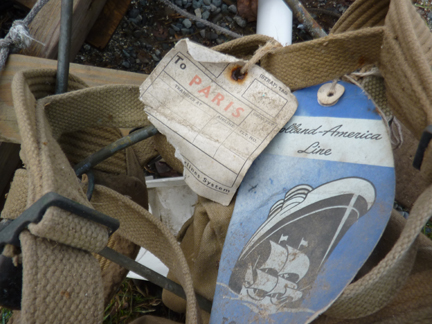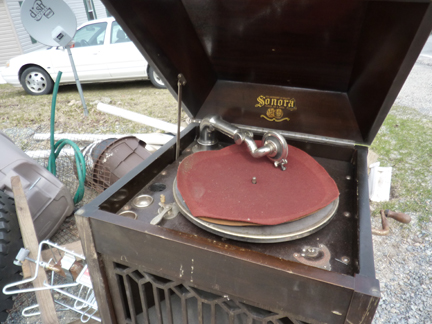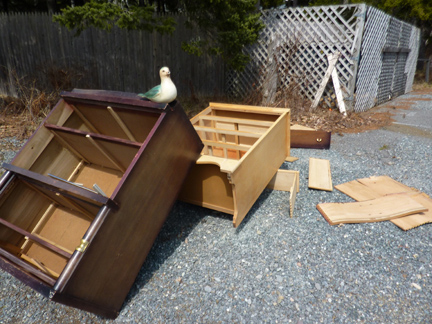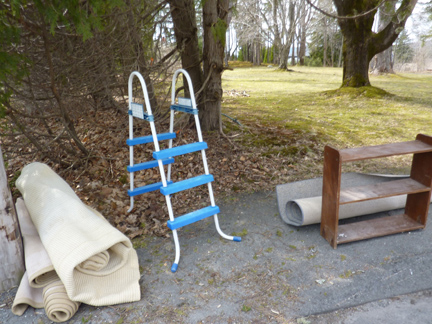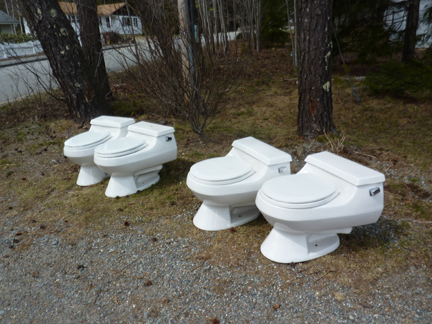Every April our town offers a roadside pick up. Things too big to put in the weekly household trash collection can be hauled to the curb and taken away for burning, chipping, recycling or to the landfill, whatever the town deems best. This is a wonderful service, and while every year there is discussion of stopping it as an unnecessary expense it is always voted back in.
Refrigerators, three-legged chairs, new-in-the-box mattresses, dysfunctional propane heaters, table umbrellas with torn canvas, a Nordic track with no visible flaw except being out-of-date, the items are motley and incongruous. A clean, pristine, aqua-glazed flowerpot, price tag attached, leaves one wondering why it is on the curb. Did its mate die an untimely death, and it was unwanted as a single? Nearby a jumble of broken and unidentifiable parts leave no doubt why they are awaiting pick up. Most things are in poor condition, truly worthy of being hauled and away and mashed, but there is a fair amount of stuff that has a lot of life left.
I grew up in suburban Connecticut, and the idea of a week of unwanted items adorning our groomed lawns and perfectly trimmed hedges was unthinkable. These roadside discards fascinate me. I love to slow down as I pass a pile. I am not looking for a treasure, I am simply mesmerized by the stuff. I spot two matching twin maple beds with frames, and remember someone asking me if I knew of any. There is no way am I going to remember which friend needs some. As I look at them and force my brain to cough up the name, a van pulls up and the beds are gone. I admire a vintage rucksack with dusty labels. Some venturesome soul from Otter Creek went to Paris, departing on a Holland America cruise ship October 13, 1951. I cannot make out the name, and really want to know. Was it a neighbor, or a relative of my husband? I stoop to photograph the graphically beautiful label, and a couple prodding the pile near me ask if I am taking it. “No” I reply, and it is pulled away while I quickly snap a picture, and in less than a minute they open it and dump the leather sandals, men’s size 10 and in excellent condition, circa 1950, onto the ground, hop back in their bulging station wagon, and head off to the next pile.
I look at an old victrola, the legs are rotted and it struggles to stand erect. A neighbor wanders over and says, “I’m going to take that,” as he rubs his index finger with his thumb. “It’s worth money, and I sure need some.” He heads back home, presumably to get something to move it with, but when I pass by the next day I see two energetic fellows toss it on their truck and move on. Pick up week is not a waiting game. They are not bumper-to-bumper, but the cruising vans and trucks form a steady line through the town, and hesitating is not a good choice.
Looking at other people’s discards and speculating on the history behind them is only one aspect of the annual pick up. I also have the chance to do my own housecleaning. Dragging things out of the shed or basement to the roadside is satisfying, a general spring-cleaning, good feeling. Finding it gone the next morning, picked up by someone in one of the slowly cruising pickup trucks that populate our streets every year at this time, is also satisfying. I ponder; do I really want to get rid of this wooden swinging patio chair? It works, it’s cool, just needs to be refinished. In the pile it goes. I do have the option of snatching it back on Wednesday, which is the day the town picks up on our street. I have yet to snatch anything back. I rarely know who takes my offerings, but they are in my mind. There is a connection between us. The plaster lion, once boldly painted, was used as a doorstop until he had his tail whacked off by a vehement door closer. I brought him outside, intending to repair the tail. Instead the rain washed off his lovely colors. He was now not only tailless, but also colorless. My husband several times picked it up. “Garbage?” he asked. “No,” I said. Eight months later it becomes part of town pick up week, as I lovingly set the lion down by the road. In less than six hours he has a new home. I do not know who saw him and wanted him, but I smile with pleasure that someone did, and whoever they are, we are connected, because we both saw something we loved in that plaster lion.
Cruising and checking out other people’s leavings is fascinating. I also appreciate being able to offload things that cannot go in household trash. Without pick up week, I would waste a Saturday morning, as it’s over half an hour drive to the transfer station which then charges you by the pound. It probably wouldn’t happen. The piles in the shed would grow, and grow, overwhelming my daughter and family when I move on.
Since I do have this convenient method of disposal at hand I have turned it into a game. I have become obsessed with rating my leavings, and guessing how long they will be sitting unwanted by the road. I haul a matched set of spring steel chairs to end of the drive. These have to be the most comfortable pieces of lawn furniture around. But they need to be sand blasted and I am not going to do that. They don’t last long.
My goal is to have everything I put out taken before the town truck comes around. I come close. I like to think I have a pretty high quality of discard. I have also spotted some of my leavings in the home of my stepdaughter, and that of neighbors who live down the road. My stepdaughter rescued the pink and black marble chess set with four broken men, a Bermuda souvenir that has been replaced. The neighbors took the sunny yellow lavatory sink, and thanked me. They said they liked passing my house at pick up week because I had such interesting stuff. Maybe they took the lion.
This exchange of goods is a phenomenon few towns share. The gains are innumerable. The vast piles shrink as people who have either a use or a market for them take things. These objects are given a second life rather than being disposed of by the town, which costs not only labor but disposal fees. Bar Harbor, a neighboring town, has forbidden removal of anything from their transfer station. Liability is the reason, and yet what a shame. Instead of recycling they are adding to the mass of garbage that has to be dealt with at great expense.
I check my pile, and am delighted that someone took the glass carboy with some nameless liquid inside. It is a great bottle, but I’d planned to clean it for ten years, it was time to let someone else plan to clean it. The table saw my dad and I bought at a yard sale for him to use was sadly put out; he is no longer here to use it. A friend spotted it, and was ecstatic. I helped carry it to his house, pleased it would continue to be used, and by someone who knew and admired my dad.
Town pick-up is not about the town generously removing our big trash, though we appreciate it. It is about passing on tales and tools, being tantalized by incomplete stories, and giving things another purpose and another life before they get trashed.
Now, will someone please tell me who went to Paris in 1951?

